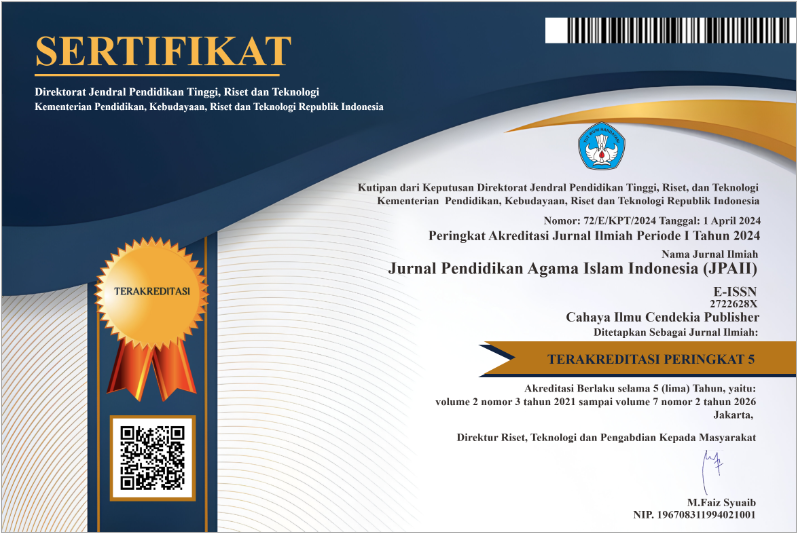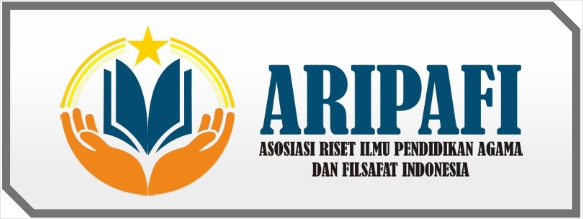Interaction of Islamic Religious Education Teachers with Students in the Learning Process
Abstract
Purpose of the study: the behavior or ethics of students at SMA Negeri 2 Libureng, Bone Regency, which basically students do not comply with the rules that have been implemented at school which results in a lack of ethics owned by students so that various conflicts arise which basically damage the ethics of the students themselves such as lack of discipline, frequent fights between fellow students and the lack of developing the talents possessed by students.
Methodology: The research conducted by the author is classified as a qualitative descriptive research carried out in the field (field research), using observation guidelines, interview guidelines, and documentation formats as instruments for collecting data on students and teachers of Islamic Religious Education subjects which are considered to provide reliable data needed.
Main Findings: The results of the study show that there is very good interaction between educators and students in the learning process. This can be seen from the various facilities or means that greatly support the formation of the character that is expected of students to become better individuals.
Novelty/Originality of this study: Although there is much research on the importance of ethics in teaching and the role of Islamic religious education in shaping students' moral values, there is limited research that has systematically explored the relationship between the ethics of Islamic religious education teachers and student interactions in certain contexts. educational context, especially in Indonesia. Therefore, this study aims to fill this gap in the literature by providing valuable insights into the relationship between Islamic religious education teacher ethics and student interaction in the learning process.
References
M. Dwi, W. Ernawati, A. Sanova, D. A. Kurniawan, and E. Triani, “Students ’ Attitude Towards Science and Its Implications on Science Learning Outcomes of Junior High School Students,” J. Pendidik. Progresif, vol. 12, no. 2, pp. 898–911, 2022, doi: 10.23960/jpp.v12.i2.20223.
A. Alfauzan, A. Alimni, K. D. Agus, T. Elza, and W. Adi, “Implications of Teacher Interpersonal Communication Ability on Student Learning Motivation in Islamic Religious Education Lessons During Pandemic,” J. Educ. Res. Eval., vol. 6, no. 1, pp. 156–167, 2022.
A. M. Nawahdani, E. Triani, M. Z. Azzahra, A. Kurniawan, and D. Melisa, “Hubungan Minat dan Motivasi Belajar Siswa terhadap Mata Pelajaran Fisika,” J. Penelit. dan Pengemb. Pendidik., vol. 6, no. 1, pp. 12–18, 2022.
M. Ramli, “Hakikat pendidik dan peserta didik,” Tarb. Islam. J. Ilm. Pendidik. Agama Islam, vol. 5, no. 1, 2015, doi: https://dx.doi.org/10.18592/jtipai.v5i1.1825.
Darmaji, Astalini, D. A. Kurniawan, and E. Triani, “The effect of science process skills of students argumentation skills,” J. Inov. Pendidik. IPA, vol. 8, no. 1, pp. 78–88, 2022, doi: https://doi.org/10.21831/jipi.v8i1.49224.
Kamid, H. Sabil, W. Syafmen, and E. Triani, “A Study of Problem Based Learning and Mathematics Process Skills in Elementary School,” J. Ilm. Sekol. Dasar, vol. 5, no. 2, pp. 359–368, 2021, doi: http://dx.doi.org/10.23887/jisd.v5i2.37157.
S. Ramli, R. Novanda, M. Sobri, and E. Triani, “The Impact of Student Responses and Concepts Understanding on the Environmental Care Character of Elementary School Students,” Int. J. Elem. Educ., vol. 6, no. 1, pp. 48–57, 2022.
R. K. Wardani, H. Santosa, and D. Rahmawati, “Pengaruh Academic Supervision Of School Heads Dan Interpersonal Communication Terhadap Teacher Performance Sekolah Dasar Negeri Jakarta Selatan,” TADBIR J. Stud. Manaj. Pendidik., vol. 4, no. 2, 2020.
A. Irwana, “Pola Interaksi Edukatif Guru Fiqih dengan Siswa Kelas VIII DI MTs Negeri 1 Model Palembang.” UIN Raden Fatah Palembang, 2016.
U. Sutisna, “Etika Belajar Dalam Islam,” Fakt. J. Ilm. Kependidikan, vol. 7, no. 1, pp. 49–58, 2020.
Copyright (c) 2023 Andi Mariani Ningsih, Fisky Fitria

This work is licensed under a Creative Commons Attribution-NonCommercial 4.0 International License.
Authors who publish with this journal agree to the following terms:
- Authors retain copyright and acknowledge that the Jurnal Pendidikan Agama Islam Indonesia (JPAII) is the first publisher licensed under a Creative Commons Attribution 4.0 International License.
- Authors are able to enter into separate, additional contractual arrangements for the non-exclusive distribution of the journal's published version of the work (e.g., post it to an institutional repository or publish it in a book), with an acknowledgment of its initial publication in this journal.
- Authors are permitted and encouraged to post their work online (e.g., in institutional repositories or on their website) prior to and during the submission process, as it can lead to productive exchanges and earlier and greater citation of published work.






.png)
.png)





















